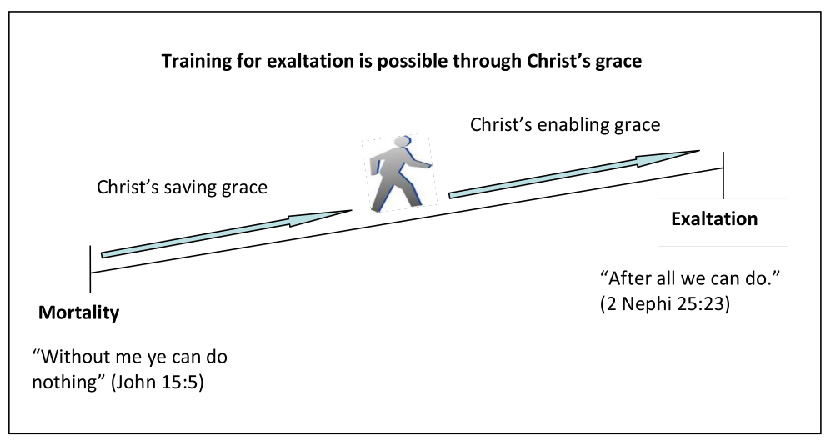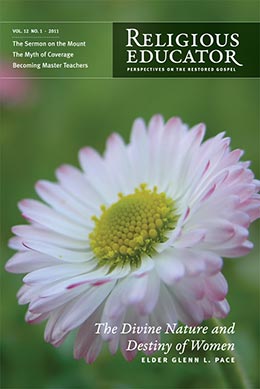The Merits, Mercy, and Grace of Jesus Christ
P. Scott Ferguson
P. Scott Ferguson, " The Merits, Mercy, and Grace of Jesus Christ," Religious Educator 12, no. 1 (2011): 39–51.
P. Scott Ferguson (fergusons@byui.edu) was a full-time Religious Education faculty member at BYU–Idaho when this was written.
 The divine trio of Christ's merits, mercy, and grace enables humankind to condition and train for eternal life and endure to the end. Matt Reier, © Intellectual Reserve, Inc.
The divine trio of Christ's merits, mercy, and grace enables humankind to condition and train for eternal life and endure to the end. Matt Reier, © Intellectual Reserve, Inc.
Many of the lessons I gleaned through ten years of training to run marathons are now quite useful as I apply them to my pursuit of exaltation. My decision to be a marathon runner affected every aspect of my life—diet, exercise, work, and even my personal relationships. My first marathon goal was simply to finish, although secretly I hoped to run the 26.2 miles in four hours or less. My training began with a very difficult one-mile run. But one mile soon became two, and within a few weeks I was running three miles every other day and adding 10 percent to the distance of my longest run each week. Within a few short months, I was running twenty-five miles a week. Progress came quickly; I continued weekly mileage increases, including a long run each week. Within six months, I was ready to run my first marathon. The weekend for the run arrived, and I finished in three hours and fifty-nine minutes. I accomplished my goal. I was elated and ready to train for another.
As I trained for my second marathon, progress was much slower. This was due in part to replacing my goal of just finishing with a more rigorous goal of finishing in three hours and twenty minutes. I was determined to run this marathon forty minutes faster than the first. This new goal completely changed the dynamics of my training, placing me in competition with myself. In addition to doubling weekly mileage, my new goal required speed and hill training. More than once I questioned if it was worth all the effort. With the first goal of just finishing, training injuries were not a problem. But the more I focused on speed training and increasing endurance by running hills, the more I struggled with injuries like pulled hamstrings and stress fractures. Increasing weekly mileage, speed training, and healing from injuries all contributed to slower progress. To be a competitive marathoner required commitment, devotion, and hard work. There was no reprieve to training.
As I reflect on my days of training for marathons, I see powerful corollaries to our quest for exaltation. The lofty goal of obtaining exaltation requires consistent, faithful effort. It isn’t enough to run the race for exaltation with a goal just to finish. We must focus on the quality of the daily run. There is no question that running to finish is part of the program, and there are many days of our mortal experience when we go to bed grateful for having just finished the day. But as we progress in our training, we move from the goal of trying to finish to the goal of finishing well. While perfection is a worthy goal, we should remember it is also a process that requires patience and training. In the Sermon on the Mount, the Savior taught, “Be ye therefore perfect, even as your Father which is in heaven is perfect” (Matthew 5:48). The Greek word from which perfect is translated means “complete, finished, and fully developed” (Matthew 5:48, note). I sense a process in the words complete, finished, and fully developed.
Other similarities exist between training for a marathon and running the race for exaltation. Training the body to run a marathon takes commitment, hard work, and consistent effort. In the early stages of training for a marathon, results come quickly. The new runner sees immediate results of increased weekly mileage, faster miles, and longer distances. But soon there comes a point where visible results taper off as training expectations increase. The new member has access to the blessings of the Holy Ghost, priesthood, living prophets, and new scripture. As these gifts are received and magnified, expectations change. The focus now shifts to preparation for greater covenants and blessings found only in holy temples—the spiritual equivalent of hill and speed training—a more rigorous training indeed.
As expectations increase, we find ourselves nursing injuries before unknown. The need to just live a good life has been replaced with sacrifice and consecration. Before long, things can begin to feel a bit overwhelming. In the early stages, our enthusiasm and excitement are often evident as we embrace gospel commitments found in new callings, serving missions, attending the temple, and many other church assignments. Early in our training, we discover gifts of the Spirit previously unknown, and evidence mounts that those gifts are at work in our lives.
By contrast, the longtime member who is enduring to the end may feel overwhelmed, burdened with injuries, and discouraged with the hard work of seeking his or her spiritual best. This paper is written to those of us who feel we are seeing smaller gains as we increasingly put forth greater effort to obtain exaltation. The Lord is committed to our success, as he said to Abraham: “There is nothing that the Lord thy God shall take in his heart to do but what he will do it” (Abraham 3:17).
 Christ's fulness of glory and his merits, mercy, and grace create a divine tandem that uniquely qualifies him to show us the way. Greg K. Olsen, © 1990.
Christ's fulness of glory and his merits, mercy, and grace create a divine tandem that uniquely qualifies him to show us the way. Greg K. Olsen, © 1990.
Christ Is Our Mentor
We have direct access to a loving Savior who wants us to succeed. Lehi taught his sons, "There is no flesh that can dwell in the presence of God, save it be through the merits, and mercy, and grace of the Holy Messiah" (2 Nephi 2:8; emphasis added). Through these gifts we overcome our fallen natures, sin, temptation, and the devil. Through consistent training and the awareness and appreciation for our incremental gains, we can eventually overcome. With Christ as our mentor, we can do it!
When feeling discouraged, we need to trust the one who does know and guides our training—Jesus, our perfect mentor. He was not exempt from the conditioning required of each of us (see Hebrews 4:15). There were no shortcuts for him because he is the Son of God. From the Doctrine and Covenants we learn that Christ “received not of the fulness at first, but continued from grace to grace, until he received a fulness” (D&C 93:11).
He endured adversity and affliction perfectly according to his great capacity (see Mosiah 3:7, 15:1-5; Alma 7;11-14). As a result, he is able to mentor each of us perfectly because he knows our weakness and can sow us how to gain strength (see Ether 12:27). Ultimately, he desires that we become like him (see 3 Nephi 27:27). If Christ obtained his fulness by progressing from grace to grace, can we expect to do so any differently? His fulness of glory and his merits, mercy, and grace create a divine tandem that uniquely qualifies him to show us the way. He is our personal mentor at each interval, mile, success, and defeat. Elder Jeffrey R. Holland taught: "He knows that because He has suffered 'pains and afflictions and temptations of every kind...that he may know...how to succor his people according to their infirmities' (Alma 7:11-12). To succor means 'to run to'...Christ will run to us, and is running even now, if we will but receive the extended arm of His mercy. When we stagger or stumble, He is there to steady and strengthen us. In the end He is there to save us, and for all this He gave His life." [1]
Eternal Life Is Possible through the Atonement of Jesus Christ
Overcoming our infirmities in order to be fully finished and fitted for exaltation requires a trimming down of the natural man. Speaking of the eternal exercise required to accomplish this trimming down, Elder Neal A. Maxwell observed: “Putting off the natural man . . . involves some arduous isometrics—the old man working against the new spiritual man. That natural man, as you know, will not go quietly or easily.[2] These “arduous isometrics” constitute the training required for eternity.
The divine trio of Christ’s merits, mercy, and grace enables humankind to condition and train for eternal life. Without his saving grace there is no agency, mortality, or salvation. In a real sense, we literally are saved by grace. Christ taught, “I am the vine, ye are the branches: . . . without me ye can do nothing” (John 15:5; emphasis added). Without Christ there is no opportunity for conditioning at all. And yet we are expected to train. Nephi declared, “We know that it is by grace that we are saved, after all we can do” (2 Nephi 25:23; emphasis added). Even so, our best efforts are possible only through Christ’s saving grace; without him we are powerless. Indeed, it is through Christ’s perfect life, culminating at Gethsemane and Golgotha that we are even able to do anything at all. Our willingness to access his perfect contribution constitutes our effort. Christ’s contribution of merits, mercy, and grace makes exaltation possible (see diagram below).

What about those who are unwilling to try? Even in their present inclination to sin and discouragement at any efforts to train, Christ offers his grace: “If ye will come unto me ye shall have eternal life. Behold, mine arm of mercy is extended towards you, and whosoever will come, him will I receive” (3 Nephi 9:14). Christ ran the perfect race, and now the great trainer watches as many refuse to try. But he never stops inviting. Does this imply that we may resist his pleas without consequence? Certainly not. Agency dictates our complete sovereignty to choose to train for exaltation or to settle for something much less. Even when the ability to run or train vigorously is diminished, he simply says, “Hey, let’s go for a walk.”
Merits, Mercy, and Grace
What are we referring to when we talk about the merits, mercy, and grace of Jesus Christ? Is the phrase “merits, mercy, and grace” a Hebrew phrase coined by Lehi to capture the essence of the Atonement, or is this phrase referring to three separate processes at work that comprise the Atonement? Are Christ’s merits, mercy, and grace distinct from one another? Are Christ’s merits and mercy prerequisites to his grace? I propose that the merits, mercy, and grace of Christ are three distinct elements of the Savior’s power. His merits and mercy comprise his saving and redeeming grace and are primarily concerned with the justification and redemption of mankind—“And we know that justification through the grace of our Lord and Savior Jesus Christ is just and true” (D&C 20:30). His enabling grace makes possible sanctification and exaltation—“And we know also, that sanctification through the grace of our Lord and Savior Jesus Christ is just and true” (D&C 20:31). Indeed, our ultimate goal is to be sanctified like God through the grace of his Son, Jesus Christ. We must be enabled to keep going, keep trying, keep seeking and reaching, to eventually possess a divine nature. Through the merits, mercy, and grace of Jesus Christ, all of us may be saved. Let’s look a little deeper at each of these three facets of the Atonement.
Christ’s Merits—Suffering, Death, Blood, Sinless Life
Christ is our judge, advocate, and intermediary with the Father (see 2 Nephi 2:27–28; Hebrews 8:6). Because “all have sinned, and come short of the glory of God” (Romans 3:23), there is an ongoing need for reconciliation between us and our Father. It is to the great Mediator that we look for representation. We are warmed by Christ’s plea to the Father in our behalf: “Listen to him who is the advocate with the Father, who is pleading your cause before him—Saying: Father, behold the sufferings and death of him who did no sin, in whom thou wast well pleased; behold the blood of thy Son which was shed” (D&C 45:3–4).
From these verses it is easy to visualize councils on high where matters concerning this earth are continually discussed and resolved. Ultimately all matters concerning this earth will be decided by the Father (see John 8:28; John 13:3). Defending our cause in these councils is our advocate to the Father, our Savior, Jesus Christ. His defense on our behalf does not consist of the collective good of our Father’s children, for justice would require a similar list of misdeeds as well. Rather, in the modest third person, Christ declares his righteousness (see Romans 3:25–26) as he pleads our cause. Christ’s sinless life, selfless sufferings, and death compose his defense in our behalf. We should note by contrast, it is a selfish Satan who dissuades us from calling upon Christ’s merits, wanting us to be declared guilty and face the cold justice of the law. In celestial courts, Christ’s merits, not ours, save us.
Training for a marathon is an individual effort. By contrast, training for exaltation is a team effort—achievable only in and through Christ. Unlike training for a marathon where hard work and excellent training produce desired results, our very best efforts will fall short of what is required to satisfy the demands of justice, as Aaron exclaimed: “Since man had fallen he could not merit anything of himself” (Alma 22:14). And Nephi observes that any progress we do make in our training is not of our own doing: “Ye have not come thus far save it were by the word of Christ with unshaken faith in him, relying wholly upon the merits of him who is mighty to save” (2 Nephi 31:19). Our finest performances in training for eternity are marred by our failings and injuries. Christ’s sinless life and perfect Atonement constitute his merits which are mighty to save.
 It is through Christ's suffering that we find joy when the eternal consequences of the law would dictate otherwise. The Greatest of All, Del Parson, courtesy of Church History Museum.
It is through Christ's suffering that we find joy when the eternal consequences of the law would dictate otherwise. The Greatest of All, Del Parson, courtesy of Church History Museum.
Christ’s Mercy
The law is just and unyielding. Alma reminds us, “There must be an atonement made, or else all mankind must unavoidably perish” (Alma 34:9). Lehi taught his sons, “The law is given unto men. And by the law no flesh is justified; or, by the law men are cut off” (2 Nephi 2:5). We know that disobedience to the law brings heartache, sorrow, and death. Between our present inability to obey the law fully and our desire for joy resides Christ’s mercy for the repentant sinner. Christ lived the law perfectly so that he could atone for our sins, thus making joy possible. It is through Christ’s suffering that we find joy when the eternal consequences of the law would dictate otherwise. He paid the price of sin and broken laws, and he extends his mercy to each of us by allowing his sacrifice to cover our shortcomings, if we repent.
Through sincere repentance, we are reconciled to the Father, but such reconciliation does not pay for the injuries that result from breaking the law. We are never better off for sinning. Only Christ through the Atonement can make right what we have broken and cannot fix.[3] Our training for exaltation will inevitably result in disobedience and injuries. And to a degree, this is what mortality is all about—using our agency to learn how to act appropriately and become Christlike. In our first estate we qualified for the opportunity to come to earth, receive a body, and experience mortality. Having succeeded in our “first lessons” in the world of spirits (see D&C 138:55–56) and having been taught by perfect parents, we are now prepared to receive the last lessons of the second, or mortal, estate. The celestial classroom has been downgraded to an imperfect telestial classroom, and perfectly consistent heavenly parents have been replaced with inconsistent mortal parents. This change of venue allows for unique hands-on training where veiled memories of premortal accomplishment and preparation must now compete with in-your-face mortal moments that grow out of our carnal, sensual, and devilish natures. Through the combined efforts and mercy of the Godhead, memories are enlarged and we are reminded, taught, and encouraged to live “a more excellent way” (1 Corinthians 12:31). “But the Comforter, which is the Holy Ghost, whom the Father will send in my name, he shall teach you all things, and bring all things to your remembrance, whatsoever I have said unto you” (John 14:26).
Christ’s mercy heals the injustices of mortality. A large part of our training consists of being taught through injuries that result from the injustices of others and the injustices of mortality—the “arduous isometrics” of practicing to live God’s law as we conquer the natural man. All of this is done in a hands-on fashion where God’s laws and our inability to live them clash in the crucible of justice and law. And yet we must learn to live the law. God’s eternal laws will consistently operate regardless of who chooses to live or break them. From the Book of Mormon we read, “There is a God, and he hath created all things, . . . both things to act and things to be acted upon. . . . Wherefore, the Lord God gave unto man that he should act for himself” (2 Nephi 2:14, 16). We must learn to act according to God’s law or it will act on us. If it were not for a merciful Redeemer all would be lost, whether we have broken one or all of God’s laws.
When the law acts upon us, the result is a training injury. It is through Christ’s mercy that our injuries and our souls are healed. The Savior taught during his ministry among the Nephites, “Have ye any that are . . . afflicted in any manner? Bring them hither and I will heal them, for I have compassion upon you; my bowels are filled with mercy” (3 Nephi 17:7).
Christ negotiates a settlement for each of us, wherein we are allowed the opportunity to continue to prove ourselves—an opportunity that, according to the law, should have expired. The Apostle Paul refers to this extension as justification: Christ “was delivered for our offences, and was raised again for our justification” (Romans 4:25; see also Romans 5:16, 18; D&C 20:30). Justification, according to Webster’s 1828 dictionary, can be defined as a “remission of sin and absolution from guilt and punishment; or an act of free grace by which God pardons the sinner and accepts him as righteous, on account of the atonement of Christ.”[4] And because we know we are guilty, we marvel at how Christ pardons or justifies us. Having satisfied the demands of the law, Christ is able to justify us that we might take advantage of his great plan of mercy. Alma notes this plan of mercy “could not be brought about except an atonement should be made . . . to appease the demands of justice, that God might be a perfect, just God, and a merciful God also” (Alma 42:15).
But this is not all. Christ’s mercy strengthens and rescues each of us when all the forces of evil combine against us. In long-distance runs, one must continually resist the urge to quit running—every muscle in the body cries out in fatigue for relief. Depending on running conditions, the heat or cold can make long runs unbearable. In our struggle to train for eternity, we are enticed by Satan or by the challenges of mortality to quit at each mile marker along the way. Lehi taught his sons, “Wherefore, the Lord God gave unto man that he should act for himself. Wherefore, man could not act for himself save it should be that he was enticed by the one or the other” (2 Nephi 2:16). Satan is tempting us to avoid the hard work of training for eternity, but let us not forget that a merciful Christ is also enticing us through the gift of the Holy Ghost to hold on, to persist, to be obedient and persevere.
Exaltation is a challenging goal—a goal we cannot achieve without divine assistance. Too many of us are training for eternity as if it depended on us alone. And yet we have access to a meritorious and merciful Christ who desires to claim us as his own. Moroni observed, “Christ hath . . . claim[ed] of the Father his rights of mercy which he hath upon the children of men. . . . For he hath answered the ends of the law, and he claimeth all those who have faith in him” (Moroni 7:27–28). With the demands of God’s justice satisfied, Christ is able to extend his great mercy.
Christ’s Grace—the Enabling Power
As mentioned, all of God’s children benefit from Christ’s saving grace. Earth life is possible because of Christ’s grace. All men experience this gift to a degree because all men will be resurrected. But there is another aspect of grace that provides “strength and assistance to do good works that they otherwise would not be able to maintain if left to their own means. This grace is an enabling power that allows men and women to lay hold on eternal life and exaltation after they have expended their own best efforts.”[5]
With a solid base of training, we are now ready to introduce the spiritual equivalents of speed work and hill training. These two elements of our training are designed to take us to levels previously unknown to the amateur marathoner. We are desirous of running with those who are seeking eternal life. This training is especially difficult and requires someone who has run at this level of competition to help us condition. Being perfectly obedient, Jesus “received all power, both in heaven and on earth” (D&C 93:17) and is the one to whom we turn. We may be tempted at times to conclude that Jesus was perfect because he received a fullness as the Only Begotten Son of the Father; however, scripture indicates otherwise: “He received not of the fulness at first, but continued from grace to grace, until he received a fulness” (D&C 93:13). He desires to share the fullness of the Father’s glory with all those who believe on his name (see John 17). He does this through his enabling power, which is aimed specifically at strengthening and equipping us to do good works that are beyond our capacity to do on our own.
By drawing upon this enabling power, we cross over into the final frontier of mortal imperfection—acquiring a new disposition and becoming a Saint. This comprises the most difficult stage of our training for eternity—changing personalities and dispositions that seem to define who we are or provide our uniqueness. These characteristics constitute that part of the natural man that “will not go quietly or easily.” By seeking to be enabled and yielding to Christ’s grace, we can tackle such an ominous task. King Benjamin taught his people, “For the natural man is an enemy to God . . . unless he yields to the enticings of the Holy Spirit . . . and becometh a saint through the atonement of Christ the Lord, and becometh as a child, submissive, meek, humble, patient, full of love, willing to submit to all things” (Mosiah 3:19). Elder David A. Bednar observed:
The gospel of Jesus Christ encompasses much more than avoiding, overcoming, and being cleansed from sin and the bad influences in our lives; it also essentially entails doing good, being good, and becoming better. Repenting of our sins and seeking forgiveness are spiritually necessary, and we must always do so. But remission of sin is not the only or even the ultimate purpose of the gospel. To have our hearts changed by the Holy Spirit such that “we have no more disposition to do evil, but to do good continually” (Mosiah 5:2), as did King Benjamin’s people, is the covenant responsibility we have accepted. This mighty change is not simply the result of working harder or developing greater individual discipline. Rather, it is the consequence of a fundamental change in our desires, our motives, and our natures made possible through the Atonement of Christ the Lord. Our spiritual purpose is to overcome both sin and the desire to sin, both the taint and the tyranny of sin.[6]
While Christ’s merits and mercy make possible forgiveness of sins, it is the enabling power of the Atonement that makes possible our overcoming the desire for sin—this constitutes the speed and hill training. Those who endure the more rigorous training qualify for exaltation. The Prophet Joseph Smith observed of those who are exalted: “These are they who are just[ified] men made perfect through Jesus the mediator of the new covenant, who wrought out this perfect atonement through the shedding of his own blood” (D&C 76:69).
We access Christ’s merits, mercy, and grace by drinking deeply and frequently from the living water of the Atonement. Only the living water quenches the thirsts of mortality. To the woman at the well, he said: “Whosoever drinketh of the water that I shall give him shall never thirst; but [it] shall be in him a well of water springing up into everlasting life” (John 4:14). As we drink the living water by opening ourselves to his merits and mercy, we find redemption from sin. As we drink the living water of his grace, we lose our desire for sin and find sanctification. And whether we drink occasionally or ten thousand times, we must continue to drink until the desire for sin is gone. Unlike the mortal tendency to keep track of the injustices we endure, our merciful Christ seems only to care that we drink and drink often. It is through Christ’s merits and mercy we are able to drink the living water; it is through his grace that we are able to drink often and deeply, until the “taint and tyranny of sin” are gone.
Coming Full Circle
Christ’s merits, mercy, and enabling grace combine to create the perfect training regimen for mankind to be saved in the kingdom of God. His merits of suffering, death, and a sinless life qualify him for eternal life but offer us only the hope of eternal life. Partaking of his merits and mercy alone is akin to saying “sorry” over and over again for the same weakness but never actually changing. Until saying “sorry” leads to an improvement in behavior and a transformation of desires and dispositions, we will never gain eternal life. The training is difficult and rigorous. Unless we are enabled in our training, we will surely expire. Christ’s enabling grace is available to all who tire of saying sorry over and over as they practice again and again. By calling upon his merits, taking full advantage of his mercy, and seeking his enabling grace, we find that he is “mighty to save” (2 Nephi 31:9).
I am now almost twenty years older and twenty pounds heavier and have not trained for a marathon in fifteen years. I have come full circle. I now run each day just to finish well. But finishing well is no longer measured with decreases in overall time, greater weekly mileage, or how long I can run in a single session. All these concerns have been replaced with simply trying to find joy in the training and running of life. I hope one day to echo Paul’s reflections to his good friend and colleague, Timothy: “I have fought a good fight, I have finished my course, I have kept the faith” (2 Timothy 4:7). My training consists of more willing submission to the master trainer. I am seeking to embrace the daily struggles put on the training schedule by a loving Father and Savior with the hope of doing a little better each day—to “run with patience the race that is set before [me]” (Hebrews 12:1). It is through Christ’s merits, mercy, and grace that I am sustained and made equal to the challenges set on the training schedule.
Winning the race is no longer the goal; even running the race has been replaced with just walking faithfully. I have come to fully appreciate the Lord’s perfect training regimen: “And all saints who remember to keep and do these sayings, walking in obedience to the commandments, . . . shall run [the race of life] and not be weary, and shall walk [the strait and narrow path] and not faint” (D&C 89:18, 20).
Notes
[1] Jeffrey R. Holland, “Teaching, Preaching, Healing,” Ensign, January 2003, 42.
[2] Neal A. Maxwell, “The Holy Ghost: Glorifying Christ,” Ensign, July 2002, 56.
[3] Boyd K. Packer, “The Brilliant Morning of Forgiveness,” Ensign, November 1995, 19.
[4] Noah Webster, An American Dictionary of the English Language (New York: S. Converse, 1828), “justification.”
[5] Bible Dictionary, “grace,” 697.
[6] David A. Bednar, “Clean Hands and a Pure Heart,” Ensign, November 2007, 81–82.
